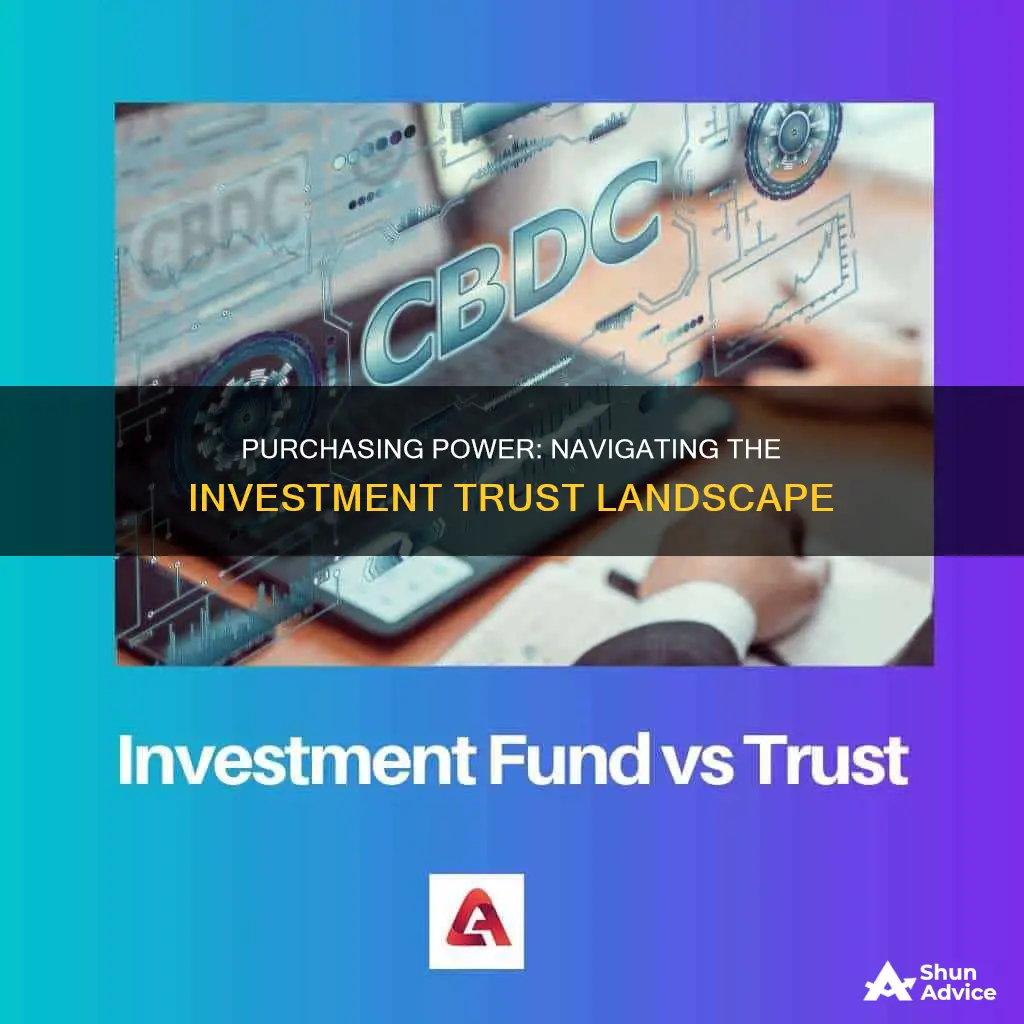
Investment trusts are a great way to boost your returns, thanks to low charges and transparency. They are listed companies with shares that trade on the stock market. Investment trusts tend to have lower costs than funds, meaning your returns are not as affected by charges.
You can buy investment trusts online, either using a stockbroker or an online investing platform. This will involve paying a trading fee, plus the usual 0.5% stamp duty chargeable on shares, and possibly other charges on top of this. When choosing a broker, consider the fees that you'll pay, but also take into consideration other factors, such as the user-friendliness of the platform and their customer service record.
If you haven't yet used up your individual savings account (Isa) allowance for the year, you can also buy investment trusts through your Isa. This will allow you to avoid capital gains tax (CGT) on any gains made (bear in mind that there is an annual £11,100 CGT allowance). You will not have to pay tax on dividend income received on investment trusts held in the Isa.
What You'll Learn
- Understand the differences between investment trusts and other financial products
- Learn about the fees and charges associated with investing in trusts
- Explore the different ways to buy investment trusts
- Learn about the tax implications of investing in trusts
- Understand the risks associated with investment trusts

Understand the differences between investment trusts and other financial products
Investment trusts are run as public limited companies, which is the key difference between them and other financial products such as unit trusts. Investment trusts issue a fixed number of shares at launch and are known as closed-ended funds. This allows them to take a long-term view and borrow money, which allows greater exposure to stock markets in pursuit of higher returns. They can also trade at a premium or discount to the value of their underlying investments.
In contrast, unit trusts are open-ended funds and continue to issue new units in response to demand. They are able to distribute income on a pre-determined basis and are unable to hold back cash to distribute in leaner years.
Another popular investment product is an exchange-traded fund (ETF). ETFs are open-end funds, and their shares are created or redeemed based on investor demand. They are similar to mutual funds in that they invest in a basket of securities, but they trade on an exchange and can be bought or sold like a stock. ETFs are usually more tax-efficient than investment trusts because capital gains can be reduced through the ETF creation and redemption process.
Strategizing for Retirement: Adapting Investment Plans for a Secure Future
You may want to see also

Learn about the fees and charges associated with investing in trusts
When investing in trusts, there are various fees and charges to be aware of. These fees can impact your returns, so it's important to understand them before investing. Here are the common fees and charges associated with investing in trusts:
Management Fee
The management fee, also known as the asset management fee, is charged by the fund manager for managing the investment trust. It is typically expressed as a fixed percentage of the total assets being managed, and the rate can differ between funds. Some fund managers charge a flat fee, while others charge a commission per transaction. The management fee also takes into account tax harvesting, rebalancing, and re-examination of your portfolio.
Performance Fee
Some investment trusts charge performance fees when the trust outperforms certain benchmarks. For example, if your trust doubles in value, you may be charged an additional fee. However, if the trust does not meet the performance benchmarks, no performance fee is applied.
Annual Charge
The annual charge, also known as the ongoing charge figure (OCF) or annual management charge (AMC), covers the cost of investing in the trust itself. It typically ranges from 0.5% to 1% of the invested assets. The OCF includes various additional costs, such as trustee fees, auditor fees, and other operational expenses.
Flat Rate
Some investment funds offer a flat rate instead of a percentage-based fee, which can be more cost-effective, especially for larger investment amounts.
Trading Fees and Brokerage Commissions
When the fund buys or sells shares, trading fees and brokerage commissions are incurred. Passively managed funds tend to have lower trading fees as they switch investments less often.
Stamp Duty and Taxes
Investment trusts may also be subject to stamp duty and other taxes, such as capital gains tax when selling shares for a profit. These taxes vary depending on your location and tax regulations.
Trustee Fees
Trustee fees are paid to the trustee, who is responsible for managing the trust and ensuring that the assets are handled according to the grantor's wishes. Trustee fees can be structured in different ways, such as a set percentage of the assets in the trust, a flat dollar amount, or an hourly rate for their time. These fees are paid out of the trust's assets and are typically paid quarterly.
Other Fees
There may be additional fees associated with the formation, transfer of assets, and maintenance of the trust, including legal fees, accounting fees, and administration costs. It is important to carefully review the trust's documentation to understand all the fees and charges involved.
Streamlining Operations: Maximizing Efficiency with Minimal Labor Investment
You may want to see also

Explore the different ways to buy investment trusts
There are several ways to buy investment trusts, each with its own advantages and considerations. Here are some of the most common methods:
- Using a stockbroker or an online platform: Investment trusts are traded on the stock market, so you can buy them through a stockbroker or an online investing platform. This option provides a wide range of choices and flexibility in terms of investing with a lump sum or regular monthly payments. However, it's important to consider the trading fees, stamp duty charges, and other potential charges associated with this method.
- Directly through an investment company: Going directly to an investment company can be a cheaper option, especially for regular investors. Some well-known investment companies offer this option, allowing you to set up a straightforward and inexpensive drip-feed investment plan. However, this approach may limit your choice of trusts as you are restricted to the offerings of that specific company.
- Using an Individual Savings Account (ISA): You can buy investment trusts through your ISA, allowing you to avoid capital gains tax on any gains made. There is usually an administration fee for opening an ISA wrapper, and it's important to note that you can only open one stocks and shares ISA per year.
- Through a fund supermarket or platform: Fund supermarkets and platforms, such as Hargreaves Lansdown and AJ Bell Youinvest, offer a range of investment trusts. These platforms often provide a user-friendly interface and competitive dealing charges, especially if you trade more frequently. Additionally, they may offer the convenience of holding all your investments in one place.
When deciding on the best option for you, it's essential to consider factors such as the level of choice, investment frequency (lump sum or regular payments), and whether you prefer to have all your investments on a single platform. Additionally, evaluating the fees, user-friendliness, and customer service of the different providers can help you make an informed decision.
The Cost of Investing: Unraveling the Fees
You may want to see also

Learn about the tax implications of investing in trusts
Trusts are taxed differently depending on their structure. The IRS permits trusts to claim a tax deduction for income distributed to beneficiaries, and the beneficiary pays the income tax on the taxable amount rather than the trust.
Grantor trusts are trusts in which the grantor controls all aspects of the trust and is responsible for reporting and paying taxes. All revocable trusts are grantor trusts, but not all grantor trusts are revocable. Income is reported on the grantor's tax return instead of the trust's. Many wealthy people favor grantor trusts over non-grantor trusts because their income tax rates are generally lower than trust tax rates.
Non-grantor trusts are those where the grantor is not responsible for reporting income or paying taxes for the trust. The trust, operating as a separate tax entity, is responsible for reporting and paying taxes on income.
Beneficiaries must report and pay taxes on income distributions. In return, the trust claims a tax deduction for the amount distributed. Non-grantor trusts are either simple or complex. All earned income in a simple trust must be distributed annually to a beneficiary or beneficiaries. However, no distributions from the principal are allowed, and distributions cannot be made as charitable donations. Conversely, the trustee uses their discretion when distributing income from a complex or discretionary trust. Distributions from the principal and those made to charities are permitted.
Trusts are subject to two tax forms: K-1 and Form 1041. Form 1041 is used to report income earned from the grantor's date of death, and Schedule K-1 reports distributions made to beneficiaries of trusts. For deaths that occurred in 2022 or 2023, the highest trust tax rate is 37%.
Trusts are also classified as either "principal" or "income". Generally, the assets the trust owns represent its principal (e.g. stocks, bonds, or real estate) and what those assets earn or produce represent its income (e.g. dividends, interest, or rent).
Structuring trusts so they distribute income to beneficiaries may be an effective way to help reduce income taxes.
Investing and Financial Aid: Friends or Foes?
You may want to see also

Understand the risks associated with investment trusts
Investment trusts can be riskier than unit trusts because their shares can trade at a premium or discount to the value of the assets they hold, known as the net asset value. The risks associated with investment trusts include:
Price Fluctuation Risk
Stock prices fluctuate according to the activities and performance of individual companies, as well as market and economic conditions. Therefore, investment trusts that primarily invest in domestic and foreign stocks are subject to the risk of price fluctuations and may incur losses.
Liquidity Risk
When buying or selling securities, there may be insufficient demand or supply in the market or trading restrictions that prevent trading with sufficient liquidity. This can force investors to trade on unfavourable terms or not at all, leading to potential losses.
Credit Risk
If the business or financial conditions of a securities issuer or borrower deteriorate, or their external evaluation declines, the prices of securities may fall, they may lose their value, or the issuer or borrower may default on interest or redemption payments.
Currency Risk
If an investment trust includes foreign currency-denominated assets, it may incur losses due to exchange rate fluctuations between the foreign currency and the domestic currency.
Country Risk (Emerging Market Risk)
The prices of securities in emerging markets may fluctuate significantly due to factors such as the political and economic situation, market supply and demand, and the performance of the issuing company. Investments in emerging markets are subject to greater fluctuations in securities prices due to political and economic uncertainties, underdeveloped market infrastructure, and large exchange rate fluctuations.
Interest Rate Risk
A rise in interest rates may reduce demand for publicly traded REITs, as investors may choose other vehicles like government-guaranteed bonds that pay a fixed interest rate.
Choosing the Wrong Sector
As online shopping increases and suburban malls decline, REITs with exposure to this sector may be a risky investment.
Tax Risk
REIT dividends are taxed as ordinary income, so investors must evaluate their tax bracket alongside income generated from a REIT. The ordinary income tax rate is typically higher than dividend tax rates or capital gains taxes for stocks.
The Power of Sustainability: Reshaping Investment Strategies
You may want to see also
Frequently asked questions
An investment trust is a public limited company that aims to make money by investing in other companies. Owning shares in an investment trust is a way of investing in a variety of different companies.
Investment trusts are run as public limited companies. They issue a fixed number of shares at launch and are known as closed-ended funds. In contrast, unit trusts are open-ended funds and continue to issue new units in response to demand.
Investment trusts can retain as much as 15% of their revenue, meaning they can maintain consistent pay-outs through reserves even in challenging markets. They can also borrow money, which can be used to buy shares or other assets. This is often referred to as 'gearing'.
You can buy investment trusts online, either via a stockbroker or an online platform. You can also buy them through your Individual Savings Account (ISA) allowance, which will allow you to avoid capital gains tax on any gains made.
Yes, there are fees and charges associated with investing in trusts. These will vary depending on where you invest and whether you seek independent financial advice.







